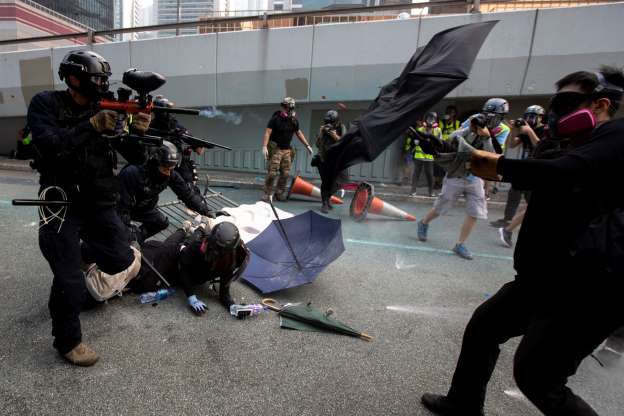By Donny Kwok, Reuters–
The lawyer for an 18-year-old Hong Kong student protester shot in the chest by police was due to appear in court on his behalf on Thursday, after the teenager was charged over his role in violent demonstrations.
Tony Tsang, who was shot at close range as he fought an officer with a metal pipe on Tuesday, was charged with rioting, which carries a maximum 10-year sentence, and assaulting a police officer.
The shooting came during a day of clashes in the Asian financial hub, the latest turmoil in months of anti-government protests that have angered Beijing and raised questions about the city’s economic prospects.
Tsang is in hospital in stable condition and was not able to attend the court session.
But about 200 supporters turned up to watch the proceedings after another night of violence as petrol bomb-throwing demonstrators angry about the shooting clashed with police into the early hours of Thursday.
Police urged the government to impose curfews to help curb the escalating violence in the Chinese-ruled city, where officers have become a target of protesters amid accusations of excessive force.
Activists went on the rampage in districts across the former British colony late into the night, setting fires, blocking roads and vandalizing shops and metro stations as police fired tear gas to disperse them.
“Wherever there are protests nearby I’ll come … I’m out tonight for a simple reason. You don’t shoot a teenager at point blank range,” said Alex Chan, an interior designer at a protest in the shopping district of Causeway Bay.
“These protests will continue and we won’t give up.”
The demonstrations have stretched the police force and transport networks to their limits.
Rail operator MTR Corp closed stations in districts including Po Lam, Hang Hau and Tseung Kwan O just before midnight on Wednesday as the violence picked up. All affected stations reopened on Thursday.
EMERGENCY LAW
The protests began over a now-withdrawn extradition bill that would have allowed people to be sent to mainland China for trial, but have evolved into calls for democracy, among other demands.
The opposition to the Beijing-backed government has plunged the city into its biggest political crisis in decades and poses the gravest popular challenge to Chinese President Xi Jinping since he came to power.
The Hong Kong government is under increasing pressure to find a solution to the confrontation.
Goldman Sachs estimated this week that the city might have lost as much as $4 billion in deposits to rival financial hub Singapore between June and August.
The city is expected to enact an emergency law that would outlaw face masks, worn by many protesters to conceal their identities, after a special meeting of the Executive Council on Friday, media outlets TVB and Cable TV reported.
The Hong Kong stock market jumped to a one-week high on the news.
Earlier in the day, Lam Chi-wai, chairman of Junior Police Officers Association, had urged the city’s leader to impose a curfew to maintain public order.
“We are only an enforcement agency with limited power under the law. When facing such a series of massive rioting incidents, we cannot work alone – clapping only with one hand – without appropriate measures and support from top level,” Lam said.
The public has become increasingly hostile towards police amid accusations of heavy-handed tactics. Police say they have shown restraint.
The lawyer for an Indonesian journalist injured when police fired a projectile during protests on Sunday said she had been blinded in one eye.
The European Union said in a statement it was deeply troubled by the escalation of violence and the only way forward was through “restraint, de-escalation and dialogue”.
The city’s tourism board announced the cancellation of a major cycling tournament, the Hong Kong Cyclothon, and the Hong Kong Wine & Dine Festival, citing “unforeseen circumstances in the coming weeks”.
Protesters are angry about what they see as creeping interference by Beijing in their city’s affairs despite a promise of autonomy in the “one country, two systems” formula under which Hong Kong returned to China in 1997.
China dismisses accusations it is meddling and has accused foreign governments, including the United States and Britain, of stirring up anti-China sentiment.
(Reporting by Donny Kwok and James Pomfret; Writing by Anne Marie Roantree and Poppy McPherson; Editing by Stephen Coates, Robert Birsel)


Leave A Comment
You must be logged in to post a comment.